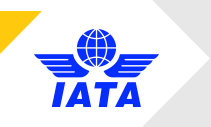IATA has called on governments in the Middle East to harmonise biosafety measures for passengers across the region as aviation restarts. A global framework for restarting aviation while protecting public health has been agreed by the International Civil Aviation Organization (ICAO) and published in the Take-Off guidance. However, inconsistent application of these biosafety measures along with unnecessary border constraints are deterring passengers and suppressing the resumption of air travel in the Middle East. “We are starting to see some governments in the Middle East open their borders to regional and international air travel. This is good news but those flying for the first time since the lifting of restrictions face an array of different types of biosafety measures and procedures – which is causing confusion among passengers and delaying the recovery,” said Muhammad Albakri, IATA’s Regional Vice President for Africa and the Middle East. “An effective COVID-19 test has the potential to be a useful risk mitigation measure. However, tests that neither meet the criteria of speed, scalability and reliability nor are offered at reasonable cost, as we are seeing in some countries in the region, have unintended consequences, causing more problems than they solve and will most likely limit the recovery in air travel demand,” said Albakri. “Imposing quarantine measures on arriving passengers keeps countries in isolation and the travel and tourism sector in lockdown. Fortunately, there are policy alternatives that can reduce the risk of importing COVID-19 infections while still allowing for the resumption of travel and tourism that are vital to jump starting national economies. We are proposing a framework with layers of protection to keep sick people from travelling and to mitigate the risk of transmission …
Read More »
Breaking News
- Kuwait Airways launches Self-Service Check-In System ensuring a seamless check-in experience for our valued passengers
- Big-ticket events set the stage for tourism growth in the Middle East
- Qatar Airways to begin operations at the new terminal One at JFK by 2026, introducing its First U.S. Lounge
- WTTC unveils first wave of international speakers for landmark 25th Global Summit in Rome
- OMRAN Group launches the second edition of the “GIFTED” Program to Promote the Inclusion of Persons with Disabilities in the Tourism Sector
- Air Arabia Abu Dhabi launches seasonal flights to Yekaterinburg in Russia
- Ministry of Economy & Tourism to host ‘UAE Africa Tourism Investment Summit’ as part of FHS World 2025 in Dubai this October to explore new partnerships & boost tourism investments
- Hospitality Management Holding Offers Budget-Friendly Summer Stays Across UAE, KSA, and Jordan
- Abu Dhabi Convention & Exhibition Bureau to host M&I Expo in 2026
- Egypt to open $1 billion Grand Egyptian Museum (GEM) on 1 November 2025
- flydubai strengthens strategic growth with 12 new aircraft deliveries in 2025
 Tourism Breaking News
Tourism Breaking News
